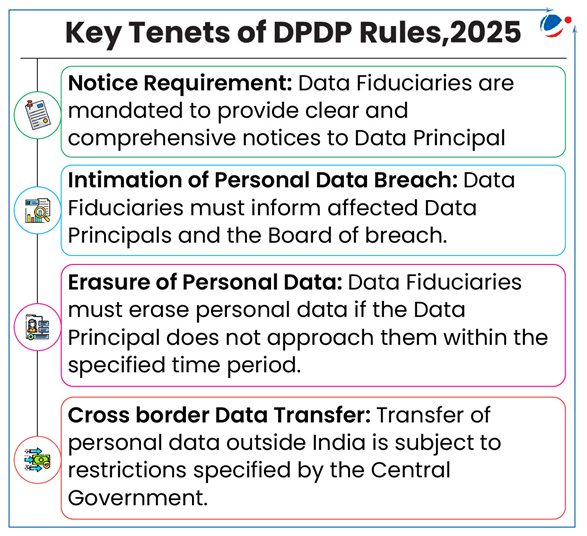
Why in the News?
Ministry of Electronics and Information Technology (MeitY) released draft Digital Personal Data Protection Rules, 2025 to facilitate implementation of Digital Personal Data Protection Act, 2023 (DPDP Act).
Brief Background of DPDP Act, 2023
- Supreme Court's K S Puttaswamy judgment (2017) recognized right to privacy as a fundamental right under Article 21 and directed the government to establish a robust data protection regime.
- In 2017, Justice B.N. Srikrishna Committee examined data protection issues. Based on its recommendations, Personal Data Protection Bill, 2019 was introduced which was later withdrawn.
- MeitY released a draft of the DPDP Bill 2022 for public consultations, which later became the DPDP Act 2023.

Digital Personal Data Protection Act, 2023
- Primary objective of Act is to establish a comprehensive framework for Protection and Processing of Personal Data.
- It protects digital personal data (means personal data in digital form) by providing for:
- The obligations of Data Fiduciaries (that is, persons, companies and government entities who process data) for data processing;
- The rights and duties of Data Principals (that is, the person to whom the data relates);
- Consent manager i.e., Person or entity that is officially registered with Data Protection Board of India (DPBI).
- It provides transparent& interoperable platform to enable data principals to give, review, and withdraw their consent.
- Financial penalties for breach of rights, duties, and obligations.
Key Provisions of Digital Personal Data Protection Act, 2023
Specifications | Detail |
Applicability |
|
Consent |
|
Data Protection Board of India (DPBI) |
|
Rights and Duties of Data Principal |
|
Obligations of Data Fiduciaries |
|
Significant Data Fiduciaries (SDF) |
|
Parental Consent |
|
Exemptions |
|
Issues of DPDP Act:
- Violate Fundamental Rights: Exemptions for State may lead to data collection, processing, and retention beyond what is necessary and may violate fundamental right to privacy.
- Missing Rights: Act omits the right to data portability and the right to be forgotten (limiting online disclosure of personal data).
- Data portability allows data principals to obtain and transfer their data from data fiduciary for their own use.
- Cross-Border Data Transfer: The Act allows unrestricted data transfer, with the government only restricting certain countries.
- State Exemptions and Privacy Risks: Act grants broad exemptions to State, allowing unchecked data processing that may violate privacy rights.
- Lack of Harm Regulation: Act does not address risks like identity theft, financial loss, or discrimination arising from data processing.
- Data Protection Board Independence: A two-year term with reappointment for Board members may impact independence, increasing executive influence. Other regulators like SEBI and CCI have five-year terms.
Way Forward
- Adopt Global Best Practices: Draw from international models like the EU-US Data Privacy Framework to enable secure cross-border data flows.
- Encourage Bilateral Agreements: Facilitate secure data transfers through international agreements, avoiding rigid isolationist mandates.
- Regulatory Adaptability: Continuously update frameworks to address emerging privacy risks and evolving technologies.
- Dedicated Task Force: Establish an AI-Privacy task force to identify risks and co-create adaptive regulatory measures.
- Clear definition: Terms like sovereignty and integrity of India should be clearly defined along with a defined procedure to provide exemption.




